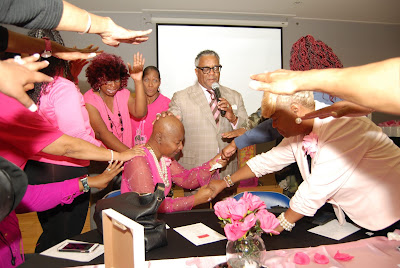Five minutes into Rhonda Myers’ 20-minute testimony, tears started
flowing in the room. She could barely get through the story without dabbing at
the tears in her own eyes.
Each riveting detail gave the more than 120 women and a couple of
men attending the annual Golden Gate Cathedral’s Breast Cancer Survivors’
Brunch on Oct. 20 all the reason to weep. And many of them did.
The majority of the women and one man in attendance are breast
cancer survivors. They apparently felt Myers’ pain, her struggle, and her will
to survive as she recounted how cancer has taken its toll on her body.
“I was scared at first. My words aren’t always correct. That’s why
I had to write everything down on paper,” said Myers, 51, reluctant at first to
take on the role of keynote speaker.
“I wanted women to see how she has persevered. Women need to know
how she has endured what she’s gone through,” said Anita Holloway, Golden
Gate’s health ministry coordinator.
Holloway had asked Myers to let the Lord use her while telling her
story.
October is Breast Cancer Awareness Month. According to the
nonprofit Breastcancer.org, an estimated 266,120 new cases of invasive breast
cancer are expected to be diagnosed in women this year in the U.S., along with
63,960 new cases of non-invasive breast cancer.
Men are at risk too. About 2,550 new cases of invasive breast
cancer are expected to be diagnosed in men this year.
For more than 10 years, Holloway has coordinated the church’s
Breast Cancer Survivors’ Brunch “to uplift and support women, to inspire each
other with their stories, including those who have not gone through with breast
cancer.”
“She (Myers) has a story to tell, and she has not given up,” said Holloway,
moved to tears herself. After Myers finished speaking, she removed her wig to show
other survivors that she is not defeated. Holloway sent up a prayer afterward.
Myers had participated in the survivors’ brunch the last two
years, but not as a speaker. “This is the first time at the brunch where people
wanted to hug me and kiss me,” she said. “I noticed that a lot of people were
crying.”
Myers was first diagnosed with left breast cancer in October of 2012,
five months after moving to Memphis from her native New Orleans to take a job
as a certified nursing assistant at Spring Gate Rehabilitation Center.
Holloway is the supervisor on the night shift. Myers worked the
three to 11 shift, but could no longer keep the job because of her failing
health. “I had to quit after having the surgery,” she said
Myers was 45 years old then, the mother of three sons. One of them
is deceased. After surgery, chemotherapy and radiation followed. During this
time, her mother was sick back in New Orleans. She brought her to Memphis. She
died two years ago.
In July of 2013, doctors
performed a mastectomy on Myers’ left breast. They discovered lesions under her
left armpit. They also found a lump on her right breast. “I didn’t want them to
do both breasts,” said Myers, eventually consenting to a lumpectomy.
At this point in Myers’ story, the roomful of breast cancer
survivors was listening attentively to the speaker’s poignant message, as if
some other malady would be revealed.
Her story continued to unfold; she wasn’t done yet. While
undergoing treatment for breast cancer, “my back started hurting,” said Myers,
who thought the pain had come as a result of the cancer treatment.
The intense pain drove Myers to Campbell Clinic, where doctors
discovered that cancer had invaded her bones. “I had it in my lumbar area,
clavicle, and a part of my lungs,” she said.
Not long after receiving the doctors’ dour bone cancer report,
Myers started experiencing excruciating headaches. Again, she sought out a
doctor. “I went to Germantown Hospital and had an ultrasound done,” she said.
The doctors found four times the amount of lesions in Myers’ brain.
In a relative short number of years, cancer laid waste to most her body. It had
attacked both of her breasts, her bones, and twice her brain. She’s being
treated now at The West Cancer Clinic.
Myers said her words don’t always connect like she wants them to.
It didn’t matter to the survivors. They understood her pain – and it gave them
a reason to fight just as hard to survive.

No comments:
Post a Comment